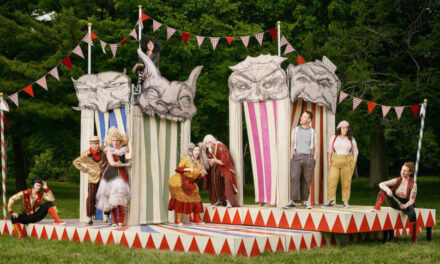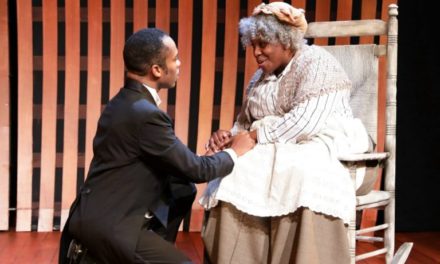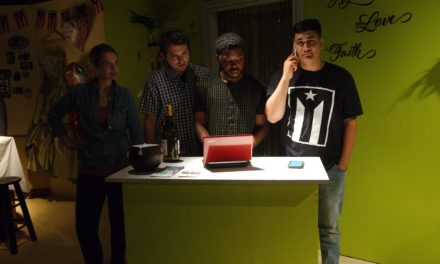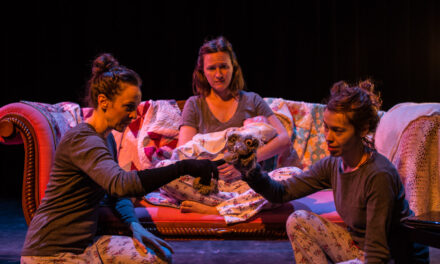Arthur Miller’s The Crucible had its premiere last spring at the Croatian People’s Theatre in Split. The Crucible was written in 1953 when the USA was possessed by anti-communist hysteria. That was also the year when Beckett’s Waiting for Godot premiered, and when Branko Gavella founded the Zagreb Drama Theatre, known today as Gavella Drama Theatre.
According to Miller, he wrote The Crucible out of desperation after he read a book about the Salem witch trials, written by the town’s mayor in 1867. Around that time, his marriage was falling apart and Miller was rightfully blaming himself. Historical and personal motives blended in the now-evergreen play which, as the Split dramatization showed, lived its fullest potential onstage.
A few years before he wrote The Crucible, Miller wrote a piece in The New York Times called “Tragedy and the Common Man” where he explained why modern playwrights don’t write many tragedies. He also wondered whether the common man could carry the weight of tragedy on his shoulders. By giving an affirmative answer, it’s as if Miller already envisaged his future protagonist John Proctor – a weak and common man, but one who sacrifices his life for the sake of his dignity. That’s the main subject of Miller’s magnificent tragedy – a struggle for personal freedom like in 17th century Salem or 20th century America, that’s also in danger in the 21st century – which can be found everywhere in the world, including Croatia.

Zoja Odak and Elvis Bošnjak in Miller’s Crucible. Photo courtesy of Matko Biljak.
Director Nenni Delmestre and dramaturg Elvis Bošnjak transposed the fight for freedom to Split’s stage. Through her direction of this play, the director once again showed her amazing versatility in 20th century American drama. Delmestre brought a lot of sound and fury to the design (by Lina Vengoechea, who is also responsible for music), but with good reason. As legendary Croatian director Dino Radojević said when his production of The Crucible (then translated as The Witches from Salem) at Zagreb’s Drama Theatre was accused of including hysteria – The Crucible is not a bloodless play, and therefore shouldn’t be performed like it is. As such, sound, fury, and silences that reveal this are intertwined with Delmestre’s well-thought-out direction. The well-considered costumes by Sara Lovrić Caparin and lively choreography from Zrinka Lukčec Kiko contributed greatly to the overall harmony of the play.
Delmestre excels in ensemble scenes, but also in intimate interplays between the male and female leads. Although The Crucible has exquisite female roles, this production – probably because of the current potential of the drama program at Split’s People’s Theatre – brought male actors to the foreground.
As John Proctor, Elvis Bošnjak took good advantage of all possibilities given by Miller. His Proctor is an imperfect, middle-aged man, lost in a mid-life crisis, but who nevertheless decides to acknowledge his true love and fight for her. As his personal drama becomes entangled with the tragedy of wider events, Proctor reluctantly becomes the leader of those who think differently. Bošnjak’s Proctor is a true tragic hero for our days, a common man who – despite the fear and horror – is fighting for freedom of thought.

Elvis Bošnjak and Trpimir Jurkić in Miller’s Crucible. Photo courtesy of Matko Biljak.
Bošnjak found huge support from his co-actors, especially in Trpimir Jurkić who, as the governor’s deputy Danforth, once again displayed his talent in all its glory. Equally dedicated to their roles were Mmarjan Nejašmić as Reverend John Hale, Nikša Arčanin as Ezekiel Cheever and Mijo Jurišić as Reverend Paris. At times, the interplay between these actors evoked the long gone, but great days of the drama section of Split’s theatre.
As for the actresses, Katarina Romac gave a very impressive interpretation of the complex Abigail Williams. Zoja Odak’s portrayal of the wise Rebecca Nurse marked an impressive comeback to Split’s theatre scene.
Arthur Miller’s The Crucible is a great play by the Croatian People’s Theatre in Split, and the production’s tiny flaws can be easily forgiven. It’s a full-blooded play that, just like Miller’s drama, tries to change the society we live in for the better.
This post was written by the author in their personal capacity.The opinions expressed in this article are the author’s own and do not reflect the view of The Theatre Times, their staff or collaborators.
This post was written by Mila Bulimbasic Botteri.
The views expressed here belong to the author and do not necessarily reflect our views and opinions.


















